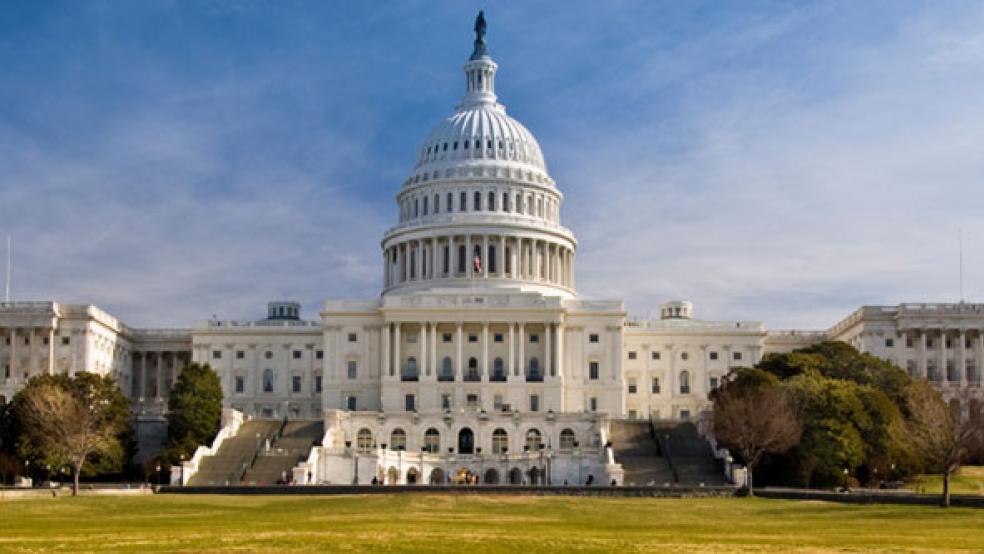Even as the congressional Super Committee grapples with how to cut the 10-year deficit by another $1.2 trillion, a feisty tug-of-war is brewing on Capitol Hill over how to implement the $1 trillion in cuts enacted last August.
Clear winners and losers are emerging from the fray.
A bi-partian “mini-bus” appropriations bill, which covers five key government agencies and could be voted on in the House later today, delivers blows to financial regulation, agricultural programs, the Census bureau, and state and local law enforcement. At the same time, it preserves or boosts spending for food safety and nutrition programs, scientific research, and the Federal Aviation Administration.
Congress hasn’t approved any bills for fiscal 2012, which started October 1. But earlier this week the House and Senate unveiled a $182 spending package that would finance daily operations for government agencies responsible for law enforcement, food safety, space exploration, scientific research, transportation, and housing.
Lawmakers are under pressure to pass the measure by Friday because it also includes a stopgap spending resolution that will keep the rest of the government running until December 16. The last continuing resolution expires Friday at midnight and without a new one, the government will partially shut down.
As expected, the mini-bus appropriations bill has drawn criticism from interest groups that support the agencies targeted for budget cuts. The Commodities Futures Trading Commission, for instance, is being asked to swallow a near one-third cut relative to what the Obama administration requested. The agency, charged with safeguarding investors in their futures and commodities trades, had a fiscal 2011 budget of about $170 million which President Obama wanted to hike to $308 billion to help implement parts of the Dodd-Frank financial overhaul legislation.
CFTC officials and Wall Street reform advocates say the $35 million increase to $205 million for the CFTCis grossly inadequate to carry out the job of writing new rules for over-the-counter derivatives, as well as probing deceptive practices at investment firms such as MF Global Holdings. “The Dodd-Frank Act assigned massive new markets to CFTC oversight, leading to a 600 percent increase in the size of the CFTC’s supervisory responsibilities,” said Lisa Donner, executive director of Americans for Financial Reform. “The funding level just advanced by the Conference Committee would barely allow the CFTC to expand its current oversight resources and would not permit the agency to implement its new responsibilities.”
Bart Chilton, a Democratic CFTC commissioner, told Reuters and POLITICO earlier this week that restraining the agency’s resources in the outlined format would squash its ability to police Wall Street.
The legislation also forces the Agriculture Department to accept $2.5 billion in reduced funding relative to what the President requested in his budget and $350 million less than what the agency operated on last year. Agricultural research, conservation, and rural economic development programs stand to lose a collective $278 million compared to fiscal 2011—cuts that farm advocates say are short-sighted.
“We’re looking at trying to go from feeding 7 billion people to feeding 9 billion people in the next 40 years. Everyone knows we can’t do that without more research so that funding is crucial,” said Mary Kay Thatcher, director of public policy for the American Farm Bureau. Farmers want to do their fair share to shoulder the nation’s budget problems, she said, “but the fact is, we’re going to do about three times our fair share in the farm bill coming up.”
The House Senate and Agriculture committees are currently working on a new five-year farm bill. It is expected to cut billions in payments to farmers and conservation programs to help solve the nation’s long-term budget problem.
A few agencies stand to benefit from the bill. The Food and Drug Administration, whose annual spending allocation is included in the Agriculture Department’s appropriations bill, received a $50 million funding boost compared to last year’s levels.
“While many agencies of government have had severe and painful cuts, the FDA has managed to get a small increase,” FDA Commissioner Margaret Hamburg said earlier this week. “It will enable us to work on some critical food safety and drug development issues.”
Bills for authorizing funding for the Pentagon and the Department of Homeland Security, Health and Human Services, and Energy are still being marked up in House and Senate Committees. They will likely be lumped together with other agency and department budgets in an end-of-year spending package.





